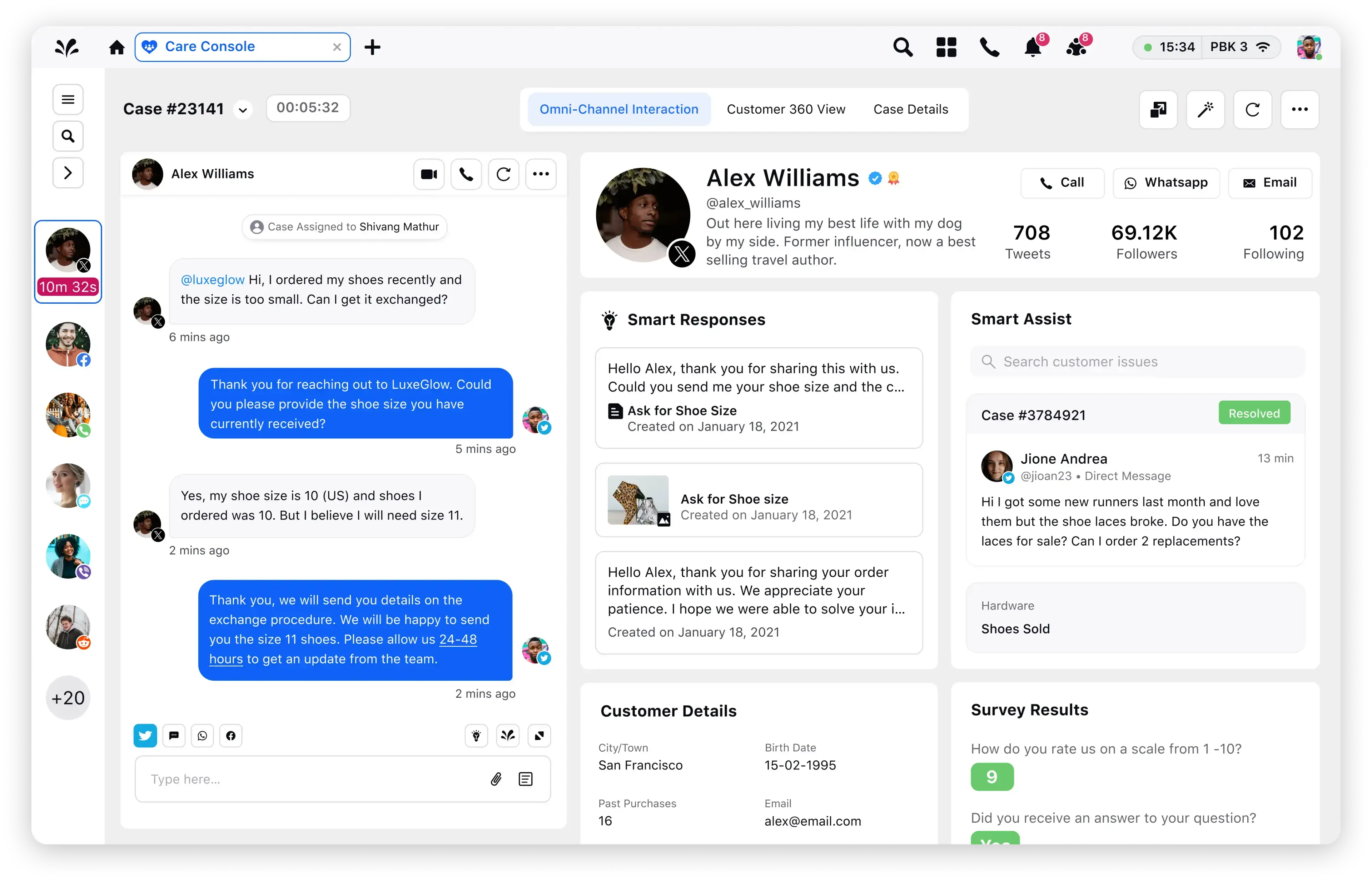The AI-first unified platform for front-office teams
Consolidate listening and insights, social media management, campaign lifecycle management and customer service in one unified platform.

Will ChatGPT and Generative AI shape the future of customer service?
In this insightful article, Shameem Smillie, a seasoned CCaaS consultant, delves into the evolving landscape of customer service. With the advent of cutting-edge tools like ChatGPT and Generative AI, she explores the exciting future that awaits the world of customer service.
There’s a lot of fear, uncertainty, and doubt surrounding AI, ChatGPT and Generative AI. It’s difficult not to succumb to the hyperbole of doom and glory being headlined worldwide. As with most content that gets our attention, this filters into the programs we watch, our socials, inboxes, DMs, podcast content and more. It’s hard to ignore the cacophony of messages, clickbait tags and headlines designed to get our attention, which can be intrusive, misleading, and far-fetched, yet also sometimes true.
Here are the most common concerns facing the adoption of generative AI:
Trust: When there is a lack of trust, it shows up everywhere. Most of us need to learn more about this technology, its capabilities, limitations, benefits, or risks related to all the areas of our lives, inside and outside of work. When you don’t know what’s real: Fool me once; shame on you. But when something is real: Fool me twice; shame on me. When elements of what you fear impact you or someone you know, the cracks become chasms that continue to feed a narrative that what you’re being told is becoming a reality.
Job displacement: Societal and economic worries continue to bubble to the surface, especially when we have the same conversations inside and outside our workspaces. No matter what industry or line of business we work in, the biggest question or concern is whether this technology means I’ll lose my job. Or, more broadly, will humans become surplus to requirements?
Traversing the hype to address the fear: Tech Vendors need to be responsible and transparent about the AI capabilities their solutions can and cannot provide. Businesses and brands must also implement the same practices while prioritising people and customers and increasing the bottom line. Both should address the discordance and forge a path to the future to survive and thrive in this fast-paced world.
Transforming your Contact Centre, CX, & Customer Service: Don’t rush to implement new AI features – do your homework, don’t skip due diligence, and build on a solid foundation with the right Tech Vendor and partner aligned with your mission, vision, culture, and values.

Where to begin
Business challenges: Address business challenges by building on a foundation that focuses on the business: people, processes, and systems. Understand the challenges, problems, and the outcomes you want to achieve. Identifying, and understanding business challenges requires careful consideration, planning, and collaboration with experts and key stakeholders across the business.
- Commit to ethical and responsible AI practices aligned with the company mission, culture, and values. Some of these challenges can be mitigated as AI technology evolves, but new ones may also emerge. Stay up to date and informed about the latest developments and best practices in AI implementation.
- Where is the data, and is it relevant? AI models, including ChatGPT, rely heavily on data for training and making predictions. Businesses often struggle with obtaining high-quality, relevant, and sufficient data to build accurate and robust AI systems. Additionally, some industries may have limited data, making it challenging to train AI models effectively.

- Address privacy and security concerns. With the increasing use of AI and data-driven technologies, there are growing concerns about data privacy and security. Businesses must ensure that the data they collect and use for AI is handled responsibly and compliant with relevant regulations to avoid potential legal and reputational risks.
- AI is a specialist subject. Implementing AI requires specialized knowledge and expertise. Many businesses may lack the in-house talent to develop, deploy, and maintain AI systems. Hiring AI experts can be costly and competitive, especially for small and medium-sized enterprises.
- Integrating AI solutions with existing business processes and systems can be challenging. Legacy systems may not be easily adaptable to AI, and ensuring seamless integration without disrupting operations is complex.
- Transparency is important. AI models like ChatGPT – generative AI are often considered black-box systems, meaning it can be challenging to understand how they arrive at specific decisions or predictions – in human terms. In some industries, such as healthcare and finance, interpretability is crucial for regulatory compliance and user trust.
- Recognise bias and fairness. AI systems can inherit biases in the data they are trained on, leading to biased outcomes. Ensuring fairness and mitigating bias in AI algorithms is an ongoing challenge that businesses need to address to maintain ethical AI practices.
- There’s always a cost. Implementing AI can be expensive, especially for smaller businesses. The costs include acquiring data, building AI infrastructure, hiring experts, and maintaining the systems.
- Scalability and performance can be overcome. As AI models like ChatGPT become more complex and require more immense computational resources, businesses must ensure that their infrastructure can handle the increased demands for performance and scalability.
- Regulation and compliance are critical. As AI technologies become more prevalent, governments and regulatory bodies are developing new rules and guidelines for AI usage. Staying compliant with these regulations and understanding the legal implications of AI deployment can be challenging.
Employee Challenges: This can be overcome by getting employees to trust and adopt AI-powered solutions. Understand the employee’s perspective. Their challenges can vary depending on the nature of the AI implementation and the organizational culture.
- Will I lose my job? Employees may fear that AI implementation could lead to job automation and ultimately replace their roles. This fear can create resistance or reluctance among employees to embrace AI technologies.
- Help Employees to understand. Many employees may not fully comprehend how AI and ChatGPT work or how they will impact their job responsibilities. The lack of understanding can result in mistrust and resistance to adopting these technologies.
- Address Training and new skills. Employees may require new skills and training to work effectively with AI systems or ChatGPT. The organization must invest in proper training programs to bridge the skills gap and ensure employees feel confident using AI tools.
- What about Human Interaction? In businesses where customer interaction is crucial, there might be concerns that AI-driven tools like ChatGPT could reduce human-to-human interaction, potentially affecting customer relationships. Understand the demographics and don’t force them to channel shift.
- Reliability and Trust are everything. Employees might be cynical about the reliability and accuracy of AI technologies. Trust issues can arise if AI systems make errors or decisions that are difficult to explain.
- Resistance to Change. Implementing AI and ChatGPT often requires changes in workflows and processes. Some employees may resist these changes, preferring traditional methods they are already familiar with.
- Ethical Concerns: Employees may have ethical concerns about the use of AI, mainly if the technology involves sensitive data or influences significant decisions. Share Responsible AI practices and address all concerns.
- Data Privacy and Security. When AI systems interact with user data, employees may worry about how that data is used and whether their privacy is adequately protected. Ensure the solution is purpose-built for compliance and governance.
- Empower your employees. Some employees might feel that AI takes away their sense of control over processes or decisions, leading to a sense of detachment from their work.
- Be transparent with Unions and Workforces. In industries with strong unions, the implementation of AI might face opposition from labour groups concerned about job security and working conditions.
Customer Challenges: Customer concerns can stem from their perceptions, preferences, security, privacy concerns and expectations about AI-driven technologies.
- Trust. Customers may be sceptical or hesitant to interact with AI-powered systems, especially if they are unsure about the technology's reliability or how their data will be used.
- User Experience. Suppose the AI or ChatGPT system doesn't offer a seamless and user-friendly experience. Customers may become frustrated or dissatisfied with the service, leading to a negative perception of the business.
- Privacy and Data Security. Customers may have concerns about the privacy and security of their personal data when interacting with AI systems. Businesses must be transparent about data usage and implement robust security measures to address these concerns.
- Misunderstandings and Misinterpretations - AI systems may not always understand customer queries or provide incorrect answers due to limitations in natural language processing. This can lead to customer frustration and dissatisfaction. Remember Steve Jobs: ‘Start with the Customer Experience, then work back to the technology.’
- Lack of Human Interaction - Some customers prefer human interactions, especially in industries where personalised service is highly valued. Using AI and ChatGPT could lead to a perception of reduced human touch, which all customers may not receive well.
- Ethical and Moral Concerns - AI decisions can have significant implications in specific industries. Customers may be concerned about the ethical aspects of AI decision-making, especially in areas like healthcare, finance, and legal services.
- Communication Style and Cultural Sensitivity - AI models like ChatGPT may not always understand or adapt to different communication styles or cultural nuances, leading to potential misunderstandings with customers from diverse backgrounds.
- Lack of Emotional Connection - AI and ChatGPT can lack emotions and empathy, which might be essential in specific customer interactions. Customers might feel that AI systems cannot truly understand their needs and emotions.

The Way Forward for Customer Experience and Customer Service
Ensure your strategy includes effective communication, education, and involvement of employees in AI implementation processes. Emphasise the benefits of AI and ChatGPT as tools that can enhance employee productivity and performance rather than replace jobs. Provide opportunities for employees to contribute ideas and concerns, offering training and upskilling programs. Foster a culture of continuous learning to help the transition and create a more supportive environment for AI adoption within the organization.
Focus on building trust with your customers through transparent communication about the use of AI, its benefits, and its limitations. Invest in enhancing the user experience of AI-powered systems, ensuring they are easy to use and provide accurate and helpful responses. Customer feedback and preferences should be considered during the implementation process to tailor the AI system to meet customer expectations better.
Sprinklr AI+ allows enterprises to combine unstructured CX data from 30+ digital channels – including social platforms, messaging platforms, and millions of publicly available news, blog, and review sites – leveraging generative AI to create content, improve feedback and assistance, and more quickly identify insights and subsequent actions.
With widespread adoption and penetration across industries, regions and use cases, Generative AI is here to stay. Sprinkler AI+ supercharges Customer Experience and Customer Service with a commitment to enterprise-level governance, security, and data privacy – a safe pair of hands.
Combine AI with human support to provide a more personalised and empathetic customer experience when needed. When you combine trust, integrity, and partnership with Responsible AI practices, you can supercharge Employee and Customer Experience, and Customer Service, making it beneficial for all.
DISCLAIMER: No AI was used to create this article.

